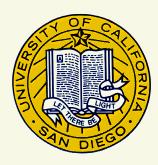The National Needs Doctoral Fellowship Program at North Carolina State
The Center for Integrated Fungal Research (CIFR) is recruiting high quality graduate students for doctoral level training in genomics, proteomics, and bioinformatics technologies applied to the study of fungal pathogens of plants and host plant responses.
In addition to normal coursework and dissertation research, Fellows will:
· Select a program mentor.
· Participate in two eight-week rotations through research programs of two CIFR faculty members.
· Experience an eight-week internship in the Research Triangle Park.
· Take full advantage of professional development opportunities.
· Develop a teaching portfolio.
· Participate in a research and professional ethics module.Present research at multiple forums including national meetings
---
Degree Programs
Applicants are able to apply through the following programs: Plant Pathology, Genetics, Plant Biology, and Genomics Sciences (Functional Genomics & Bioinformatics). All members of CIFR are faculty in the Department of Plant Pathology, and as such, students will primarily be recruited into this department. Students are selected on a competitive basis and will receive their degree in the discipline of their home department.
---
Stipend
In addition to the internship, professional development, and travel opportunities, this training grant covers tuition and fees and provides for a yearly stipend of $21,000.00
---
Interested students are encouraged to apply early. Review of applications will begin February 1st and qualified applicants will be invited for interviews in the early spring of 2009. Acceptance decisions will be made by the end of March 2009.
For additional information, please visit the website at www.cifr.ncsu.edu/NationalNeeds/Program.html
In addition to normal coursework and dissertation research, Fellows will:
· Select a program mentor.
· Participate in two eight-week rotations through research programs of two CIFR faculty members.
· Experience an eight-week internship in the Research Triangle Park.
· Take full advantage of professional development opportunities.
· Develop a teaching portfolio.
· Participate in a research and professional ethics module.Present research at multiple forums including national meetings
---
Degree Programs
Applicants are able to apply through the following programs: Plant Pathology, Genetics, Plant Biology, and Genomics Sciences (Functional Genomics & Bioinformatics). All members of CIFR are faculty in the Department of Plant Pathology, and as such, students will primarily be recruited into this department. Students are selected on a competitive basis and will receive their degree in the discipline of their home department.
---
Stipend
In addition to the internship, professional development, and travel opportunities, this training grant covers tuition and fees and provides for a yearly stipend of $21,000.00
---
Interested students are encouraged to apply early. Review of applications will begin February 1st and qualified applicants will be invited for interviews in the early spring of 2009. Acceptance decisions will be made by the end of March 2009.
For additional information, please visit the website at www.cifr.ncsu.edu/NationalNeeds/Program.html

